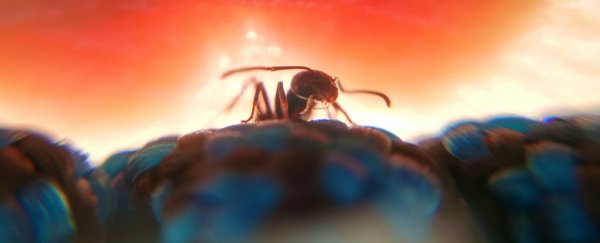It's an unthinkable ecological nightmare: the scientific prediction that up to 40 percent of the world's insect species face extinction in the next few decades.
This grim tomorrow, forecast in a widely publicised study published last month, threatens to destroy the food web as we know it. But only if the insect apocalypse is as dire as claimed.
As it stands, we don't know. But a different team of researchers have some critical things to say about the original paper, co-authored by Francisco Sánchez-Bayo from the University of Sydney and Kris Wyckhuys from the University of Queensland.
"The authors explained that they are not alarmist, but that they really wanted to wake people up," researchers from the University of Jyväskylä in Finland write in their critical response.
"If measured by the global media attention, they succeeded… Unfortunately, even if not intentional, the conclusions of Sánchez-Bayo and Wyckhuys became alarmist by bad design: due to methodological flaws, their conclusions are unsubstantiated."
The new critique, led by first author and conservation biologist Atte Komonen, doesn't dispute the widely held scientific assessment that insects are dying out (with rare, wonderful exceptions).
But Komonen et al. do take exception to the methodology of Sánchez-Bayo and Wyckhuys, and the bold conclusions they drew in their paper.
Firstly, they say that the meta-analysis, drawn from 73 historical reports of insect declines from across the globe, was flawed in sourcing its data using the keyword searches [insect], [declin*], and [survey].
"If you search for declines, you will find declines," the researchers say.
"We are not questioning the conclusion that insects are declining, but we do question the rate and extent of declines."
It's a fair point to examine closer, given that the rate and extent of declines in the original research is what gave Sánchez-Bayo and Wyckhuys' paper such broad coverage in the media (ScienceAlert included).
The Finnish team also says the studies included in the Australian research were an uneven mix, including papers that contradicted Sánchez-Bayo and Wyckhuys' stated objectives (to exclude single-species studies and shorter-duration research).
They further say the paper misused IUCN Red List categories to assess extinction risk, and may have unintentionally distorted their calculations as a result, especially since they lumped in species from a 'Data Deficient' category, which shouldn't have been included.
In addition, the researchers claim Sánchez-Bayo and Wyckhuys mishandled their assessment of the underlying drivers responsible for the worldwide insect decline, due to problems with the way they were counted for ranking purposes.
"The final problematic issue with the paper is its strong language," Komonen's team writes.
"The text is rich in non-scientific intensifiers such as dramatic, compelling, extensive, shocking, drastic, dreadful, devastating, and others… Exaggerated news made by the media itself are bad as they are, but similar exaggerations in the original scientific papers should not be acceptable."
The team notes other scientists have already voiced criticisms of Sánchez-Bayo and Wyckhuys's work, with one published article calling for "hard‐nosed, balanced, and numerical analysis of the changes taking place, and for calm and even‐handed interpretation of the changes".
Even if the critical discussion is mainly for the benefit of the research community, not those outside it, we must note that none of this is just scientific quibbling.
This is a good, essential debate the world's scientific community needs to be having about the ecological collapses we see around us, and the ways we measure those collapses.
If the insect apocalypse is even close to the devastating scale suggested by Sánchez-Bayo and Wyckhuys, we're going to need the very best science we can muster to help us, and scientific counterarguments are a crucial part of the process.
"We are concerned that such development is eroding the importance of the biodiversity crisis," the researchers say, "making the work of conservationists harder, and undermining the credibility of conservation science."
The findings are reported in Rethinking Ecology.
